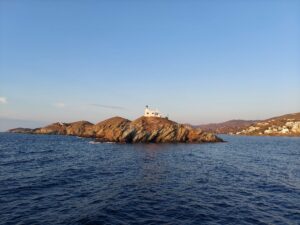Reposted from the Global CCE Blog on March 20, 2023.
By Kristen Hargis & Marcia McKenzie.
The message in the Intergovernmental Panel on Climate Change (IPCC) report released today is clear – while countries are progressing towards net neutrality, the window of opportunity to ensure we do not exceed a 1.5°C temperature rise is rapidly closing.
While the IPCC’s overall message is explicit, you may be wondering, “What exactly does the IPCC do?” The IPCC synthesizes scientific knowledge about climate change for policymakers (Ravindranath, 2010; Vasileiadou, Heimeriks, & Petersen, 2011).

The body was created in 1988 with help and support from the United Nations Environment Program and the World Meteorological Organization (WMO). All member countries of the United Nations and the WMO can participate in the Panel, which includes 195 countries.
The IPCC is perhaps the most well known for its assessment reports, which are the cumulative work of hundreds of experts around the world. To write the assessment reports, experts review thousands of academic papers before compiling summaries of the evidence base on climate change causes, impacts, and future risks, as well as options for climate change adaptation and mitigation. They also produce special reports on specific topics (e.g., the 2018 special report on the impacts of global warming of 1.5°C). All their reports are reviewed prior to publication by governments and expert reviewers to ensure they represent the latest scientific evidence.
If you are familiar with the IPCC, you may also be thinking, “Didn’t they just release an assessment report last year?” If so, you’re right. The authors of the IPCC assessment reports are divided into three working groups. Working Group I addresses the physical science basis of climate change, Working Group II addresses climate change impacts, adaptation, and vulnerability, and Working Group III addresses climate change mitigation. One assessment report cycle includes reports from each of the three working groups, as well as a synthesis report, which integrates the findings from all three working groups for a total of four reports. The four reports are published at different times over one to two years. A full assessment report cycle is published every five to nine years.
This brings us back to where we are now. The IPCC assessment report that was released today was the final synthesis report for the sixth cycle of IPCC assessments.

Or perhaps you wonder, “I know these reports aim to influence climate policy, but what impact do they actually have?” The first IPCC assessment released in 1990 is credited as contributing to development of the United Nations Framework Convention on Climate Change (UNFCCC) (Ravindranath, 2010). Each year the UNFCCC brings together 198 member nations at Conference of the Parties (COP) meetings to assess current progress on climate change and adopt new measures to support action to mitigate and adapt to climate change. For instance, it was at COP21 in 2015 that the Paris Agreement was adopted, which is a legally binding international treaty adopted by 194 Parties. These Parties agreed to reduce greenhouse gas emissions so that global temperatures would not rise above 2°C of pre-industrial levels, while also pursuing efforts to limit warming to 1.5°C.
The IPCC reports also shape public debate on climate change, and world leaders often quote report findings in speeches and decisions. In particular, policymakers and scientists make heavy use of the policymaker summaries included in each assessment and special report (Howarth, & Painter, 2015). These summaries are used by policymakers to provide background and to justify policy decisions. In fact, the policymaker summaries are so important, they are approved line by line by member countries, in consultation with the scientists who write the reports.
Given the impact of policymaker summaries on climate policy, we at the MECCE Project were curious how the policymaker summaries are explicitly focusing on climate change education. Our search for mentions of “education” finds that only 53% (17/32) of the policymaker summaries published since 1990 include any mention of education. The majority of the policymaker summaries that mention education (15) only do so 1 to 5 times per document.
When education is mentioned in the policymaker summaries, it is usually referred to as being important without saying why, giving examples of how education can aid in addressing the climate crisis, or mentioning the types of education approaches that may be needed.



“The social, economic, and cultural diversity of nations will likely require educational approaches and information tailored to the specific requirements and resources of particular locales, countries, or regions.”
Education is often mentioned when referring to education bodies as potential stakeholders, or in listing sectors key to climate mitigation and adaptation action. When education is discussed in more depth, the focus is usually on changing behaviours or sharing information related to climate change.
Only 16% (5/31) of policymaker summaries include mention of Indigenous knowledge in relation to education, all of which were published in 2014 or later. The IPCC policymaker summaries (and reports) have historically included a limited focus on Indigenous knowledge, even though the incorporation of Indigenous knowledge alongside Western science is essential for addressing climate change (Ford et al., 2016).
“Education, information, and community approaches, including those that are informed by [I]ndigenous knowledge and local knowledge, can accelerate the wide-scale behaviour changes consistent with adapting to and limiting global warming to 1.5°C. These approaches are more effective when combined with other policies and tailored to the motivations, capabilities and resources of specific actors and contexts (high confidence).”
It is striking that none of the policymaker summaries for IPCC Working Groups II (impact, adaptation, and vulnerability) or III (mitigation) mention climate justice in relation to education since issues of justice are central to any strategy to assist those most vulnerable in adapting to and mitigating climate change impacts. The IPCC reports also have room for growth in relation to the inclusion of diverse voices in their assessments. Previous reports have been criticised for “includ[ing] a geographical bias favoring experts from the global north, a gender bias in favor of men, a disciplinary bias in favor of the natural sciences over the social sciences and humanities, and finally, a cosmological bias favoring western science over [I]ndigenous knowledges” (Chakraborty & Sherpa, 2021).
So, where do we go from here? Considering the impact the IPCC reports have on international climate policy and the need for more climate change education to create the social and political will for climate action (Walfisz, 2021), it is a matter of crucial importance that the policymaker summaries include a stronger focus on education, including in relation to Indigenous knowledge and climate justice.

















